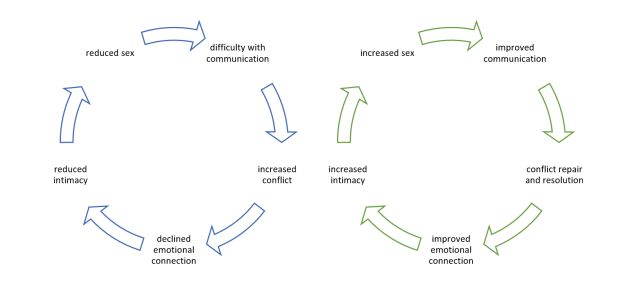Relationships
Communication and Intimacy Tools for New Parents
How to better communicate and connect during the transition to parenthood.
Posted March 10, 2023 Reviewed by Ekua Hagan
Key points
- Couples who understand each other's emotional needs and use validation can create collaborative communication.
- New parents can explore sexual and non-sexual activities to remain intimate.
- Routine check-ins and micro-dates are brief ways to prioritize a relationship, which will improve the emotional connection.

In Part I of this series, "When Couples Become Parents: The Impact on Your Relationship," I provided examples of how the transition to parenthood can cause significant changes to your relationship with your partner. Part II of this series will provide tools for communication and connection to target the previously described new parent stressors.
Couples Therapy
New parents might seek support for themselves through a therapist or medical provider. This is a great first step. However, conjoint support for both partners should be considered through couples therapy by someone trained and licensed in working with couples. Because there are clear links between the well-being of the couple's relationship and the well-being of each member of the family, couples therapy is the best way to directly address relational concerns and improve the overall mental health of the family. In couples therapy, you can learn tools and skills to communicate more effectively, including how to talk with your partner about sex and address conflict. Below are additional suggestions new parents can try on their own or in conjunction with the support of a therapist.
Communication
Now that your family has expanded, there is so much more for you and your partner to manage. There are a few essential things to consider when it comes to communicating with your partner.
1. The “How”
It’s not just what you say but how you say it. Most couples tend to fall into recurrent negative patterns of communicating with one another. So, whether they are arguing about parenting tasks, emotional needs, or anything in between, the way they fight about it is similar.
Pay attention to the familiar patterns you may have fallen into. Are you likely to criticize your partner for not doing more which is met with them defending themselves and withdrawing from the conversation stating, “I can never get it right with you.” Or, do you push down your feelings until your partner brings up something that’s bothering them, and only then do you tell them about everything you’ve been bottling up? A better understanding of each person’s role can help partners shift how they are showing up in managing relational conflict.
2. We vs. You
Try and maintain a “we” rather than a “you versus me” mindset. Couples can get into a competition—who has changed more diapers, gotten less sleep, and made more sacrifices. At the end of the day, nobody wins with this mindset.
You’re so caught up in the deep end of new parenthood that it can be hard to see that your partner might just be in the deep end too. Additionally, recognizing that your partner is also right there in the struggles doesn’t negate or minimize anything you’ve done or are experiencing.

You and your partner are a team. With a “we” mindset, couples are better able to engage in collaborative conversations about one another’s needs and engage in productive problem-solving. With a “you versus me” mindset, couples are more likely to engage in unproductive conflict in which no one feels heard.
3. Validation
Everyone is going through a major transition. If you and your partner are struggling it can be helpful to simply verbally acknowledge the efforts you see from your partner. Forcing yourself to slow down enough so you can identify, appreciate, and verbalize what your partner is doing can go a long way. Be specific and vocalize your appreciation often.
Additionally, validation can (and should) occur during moments of conflict. In moments of disagreement, your instinct may be to defend your point of view. However, it can be more effective to instead validate your partner’s perspective and emotional experience. Doing so will also shift the way you are listening to your partner so that you actually hear them.
Research demonstrates even during conflict, successful couples are able to maintain a ratio of five positive interactions for every one negative interaction. Really listening, validating, and trying to understand your partner’s perspective will go a long way in furthering the “we” mindset.
Being Intentional About the Couple Relationship
Because of the competing demands during the postpartum period, couples often lose sight of the original relationship they had with their partner (i.e., the couple relationship). During the postpartum period and early parenthood, the couple relationship requires intentionality.
It can be beneficial to set up a weekly check-in to not just discuss the tasks of co-parenting, but also to check in on the emotional health of your relationship. At this time, you can plan for when and how you want to connect that week. Research demonstrates that happy relationships can grow from even small moments of affection, intention, and care. It might feel like during the early months of new parenthood that there isn’t time for dates, but meaningful connections can happen in small ways.

The Gottman Institute has demonstrated relational benefits to micro-dates. Micro-dates involve being intentional with your time to prioritize your relationship with your partner, even if for just 10 minutes. New parents can plan to connect during naptimes or after bedtimes—no babysitter needed—by engaging in a shared activity. A few ideas include:
- Tell each other about a moment you thought of them that day or something you appreciate about them
- Enjoy a cup of hot coffee or a glass of wine together
- Give your partner a massage
During these micro-dates, table any difficult topics of discussion or planning that would cause you to fall back into your co-parenting roles. The goal of this time is to connect and strengthen the couple relationship.
Oftentimes, as communication and emotional connection improve, intimacy and sex can also improve. Many partners in relationships report that they have difficulty engaging in the sexual part of the relationship with their partner when the other parts are also struggling.

Intimacy and Sexuality
Intimacy does not inherently mean sex. For whatever reason, if a new parent does not feel ready or able to engage in sexual activities, this does not mean that all forms of physical, emotional, and sexual intimacy in the relationship are off the table. Partners can engage in conversations about what makes them feel connected and loved so intimacy can remain even if certain sexual activities are not occurring. For example, one partner might enjoy different forms of (sexual and non-sexual) physical touch while the other partner might want emotional intimacy, such as spending quality time with their partner. These conversations are important so partners don’t avoid all behaviors they perceive might lead to sex, which will only further create distance. Because these conversations can oftentimes be nuanced and emotionally charged, these conversations in particular can be beneficial to have in therapy with the help of a trained therapist.
To find a therapist, please visit the Psychology Today Therapy Directory.




